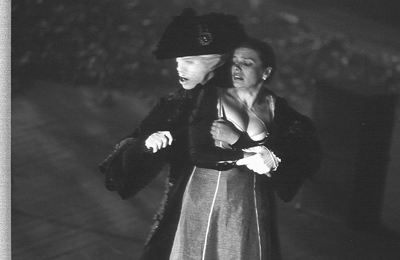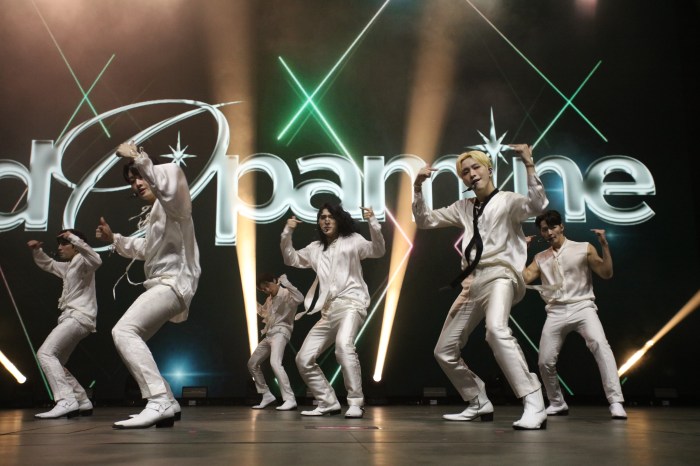Spoleto Festival operas challenge and illuminate
Charleston’s yearly Spoleto Festival USA is a heady whirlwind of the arts is a lovely setting, with history, cuisine, and leisure opportunities almost too numerous to explore. And yes, there’s a gay vibe afloat if you look.
Though my quarry was operatic—“Roméo et Juliette,” suddenly and deservedly popular again, and “Don Giovanni,” both seen May 29—I also took in the superbly athletic Paul Taylor Dance Company and a nice chamber concert overseen with great panache by local-boy-made-good Charles Wadsworth.
Both operas featured outstanding ensemble work from soloists and chorus alike—sometimes hampered, sometimes aided by aggressively activist directors. Gounod’s Shakespearean tragedy was successful largely due to the stylistic conviction and lavish vocal gifts of its highly attractive leading couple. 2005 “Singer of the World” Nicole Cabell showed herself a finely detailed tragic actress, with truly a lovely sound and presence. Consonants could occasionally have been more distinct but she phrased with utmost musicality and feeling; the difficult potion aria was absolutely thrilling.
Take notice—the next major francophone tenor may be young Québecois Frédéric Antoun, who enacted Roméo with disarming sincerity as a dreamy loner. His darkish lyric voice offered admirable dynamic variety and beautifully forward diction. Despite occasional flatting in the tricky transitional “passagio,” high notes above it were secure and exciting. Both Cabell and Antoun have the goods for major careers.
The production by Opéra Français de New York’s Jean-Philippe Clarac/Olivier Deloueil drew some audience puzzlement—the action took place in a corporate funeral home, seemingly protected by a Mafia boss Duke (the veteran Malcolm Smith, very creditable). The Capulets were soulless technocrats and the Montagues a loose bunch of “retro hip” slackers; any sense of rival houses vanished.
Some touches misfired—flashlights in the audience’s eyes, a tired pseudo-Brechtian device which need never, ever be used again, and a gratuitous drag scene for Mercutio during his “Mab” narration, serving only to obscure the notably excellent style and voice of Paris-trained Kevin Greenlaw. However, certain scenes showed unusual flair and psychological insight, like a playfully sexy “Ange adorable” that really seemed like two adolescents meeting and an affecting, improvised-seeming wedding scene—in a lab room!
As Capulet, Brian Mulligan—so far only given crumbs at the Met—exhibited a fine, strong leading baritone. Despite iffy French, Rosendo Flores made a sonorous Laurent, here a mortuary priest and doctor. Christine Abraham and Victor Ryan Robertson brought fiery personality and good sound to Stéphano and Tybalt. Tomasso Placidi led with Romantic sweep but supported the singers’ phrasing, never neglecting Gounod’s coloristic detail.
Günter Krämer’s site-specific “Don Giovanni” proved a sensation last year and—rare for Spoleto—was brought back again with the same cast (except for Andrey Telegin, a trenchantly impressive Commendattore); thus it had a genuine festival feel, in which experienced collaborators interacted and improved upon work already done. The second act was apparently quite altered; Krämer cut some recitatives and re-ordered musical numbers—only “Ah, fuggi il traditor” disappeared completely—often with striking insight, at least for this particular conception. Thus “Il mio tesoro” followed “Non mi dir,” as a gesture of consolation and cry for help.
The set installation by Ulrich Schultz in a dilapidated, abandoned civic gymnasium was quite incredible—a contoured landscape of sloping wooden floors, a dozen trees (mainly cherry), a pond in which the peasants frolicked, and two enormously huge heads, one an open-mouthed skull that emerged through the floor at the end as a conduit—complete with choral devils—for the Don’s descent to Hell. Guido Petzold lit this unique world with distinction. Falk Bauer’s costumes, sumptuous or skimpily sexy as needed, lent each singer a distinct silhouette, aiding in identifying them at a distance, especially when lurking in dark corners of the set.
Rarely did the principals leave the space entirely; the resultant “overhearings” were not Ponnelle-style nosiness but added subconscious textual layers, as when Anna and Ottavio observed a particularly sensual enactment of “Vedrai, carino” and confronted their own repressed frustration. Admirably in control in these challenging circumstances, Emmanuel Villaume led an excellent, fluid performance with a fine young cast, and even younger orchestra. The singers required physical discipline and courage to enact what was asked of them; everything from acrobatic stunts to interaction with both audience (on three sides) and orchestra members sharing their playing area—occasionally violinists moved to get away from the splashing. This level of deconstruction could destroy a piece, but though there were a few inexplicable touches, the overall effect was riveting, enlightening and a lot of fun.
The whole cast was admirably committed and, vocally, at least very good. Joana Gedmintaite’s intensity and well-knit tone overcame occasional unsteadiness as Anna; Mark Thomsen, very musical, sounded rather dry of timbre; Brian Banion sang Leporello with decent solidity but acted him with boundless energy and individuality. Monica Yunus and Keith Phares—surely a future Giovanni—brought unusually fine instruments to the peasant couple and acted up a storm. With a ravishing lyric soprano of clear international Mozartean potential, Ellie Dehn sang one of the great Elviras of my experience, fearlessly limning a sensual, funny, desperate woman worthy of Almodóvar.
But the whole show was predicated on the charisma of Nmon Ford, formidably seductive of physique and manner, mercurial of mood and with a smooth, rich baritone. A deeply memorable “Don Giovanni.”
David Shengold (shengold@yahoo.com) writes about opera for many venues.
gaycitynews.com


































